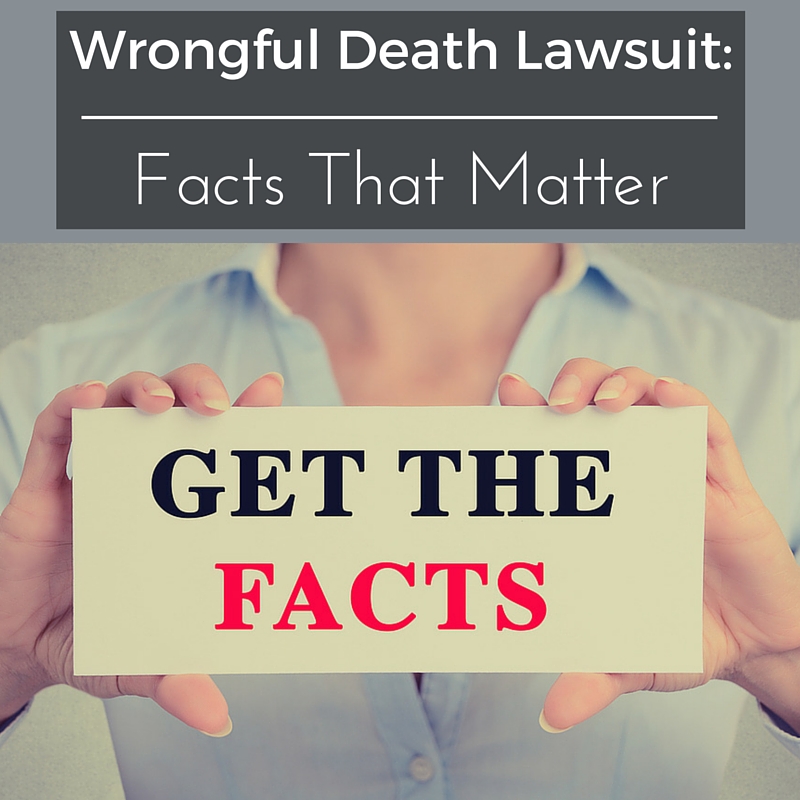Wrongful Death Lawsuit: Facts That Matter


When someone dies of injuries received due to negligence or misconduct, it is possible that loved ones of the person who died may sue for wrongful death.
In some cases, a claim may be filed after a criminal trial, such as in the case of a drunk driver or other criminal offense. However, even if someone is found not guilty of a criminal offense, it is possible for the loved ones of the person who died to file a claim against them in civil court. One famous example of this was the civil suit filed and won against O.J. Simpson after he was acquitted of the death of his ex-wife. The family of Nicole Brown Simpson won the wrongful death claim despite the fact that Simpson was not found guilty in a criminal trial.
There are some important facts that matter in wrongful death claims, however.
What is a Wrongful Death Claim?
When someone dies due to the legal fault of someone else, there may be a claim for wrongful death. They involve all types of fatal accidents, whether it is a car accident, medical malpractice or product liability.
Anyone can be held at fault in such a claim, including corporations, individuals and even governmental agencies.
The purpose of the claim is to allow the family of the deceased to receive compensation for what they have lost after the death of the person, such as lost wages or funeral expenses.
Who May Sue for Wrongful Death?
A claim must be filed by a representative of the survivors who suffered damage after the loss of a loved one. In legal terms, these are known as the “real parties in interest.”
Often, the executor of the estate is the representative who files a claim, but if the person died without a will, who may file a suit depends on the state where the claim will be filed. In all states, immediate family members such as spouses and children, whether natural or adopted, may file a claim.
In some states, a domestic or life partner or person who was dependent on the person who died may file the suit. States may also allow distant family members, those who will suffer financially after the person’s death or parents of a deceased fetus to file claims.
Discussing your relationship with a personal injury attorney is the best way to determine if you or someone else must file the lawsuit.
Who May Be Sued?
Suits may be filed against any number of persons who may be responsible for the death of someone. In some cases, there may be more than one person at fault so the suit may be filed against more than one person. Some of the most common defendants in such lawsuits are:
- The driver or employer at fault in the automobile accident
- The designer or builder of the faulty roadway
- A government agent who failed to provide adequate warnings regarding a road hazard that caused the accident
- The manufacturer, distributor, or installer of a faulty or dangerous part of the vehicle
- The persons who sold, served, or gave alcohol to the impaired driver, or
- The owner of the premises where the alcohol was served.
Types of Damages
There are three types of damages that may be recovered in a claim. These include:
Economic damages.
These include the value of the financial contributions the victim would have made to the survivors if he or she didn’t die, and include the following:
- Medical and funeral expenses connected to the death
- Loss of the victim’s expected earnings
- Loss of benefits, such as pension plans or medical coverage
- Loss of an inheritance caused by the untimely death, and
- The value of the goods and services that a victim would have provided.
Non-economic damages.
Although less tangible, non-economic damages often have more value than economic damages. Examples include:
- Damages for the survivors’ mental anguish or pain and suffering
- Loss of the care, protection, guidance, advice, training, and nurturing from the deceased
- Loss of love, society, and companionship from the deceased, and
- Loss of consortium from a deceased spouse.
Punitive damages.
Punitive damages are awarded to punish the defendant for especially bad conduct.
In many states these damages are not available in wrongful death lawsuits or not recoverable against certain defendants including most governmental agencies. However, treble damages (which are in an amount equal to three times the actual damages) may often be recovered against nursing homes for elder abuse and death.
Time Limits to File a Claim
In Pennsylvania, Delaware and New Jersey, a claim must be filed within two years of the date of the deceased person’s death. There may be exceptions to the statute of limitations in all three states, which is why it is important to discuss your case with a personal injury attorney.
If a loved one has died of injuries sustained due to the negligence or wrongdoing of another person or organization, you may have a wrongful death claim. Contact our personal injury attorneys at Lundy Law today to learn what rights you may have. Complete the simple contact form or call us at 1-800-Lundy Law.
